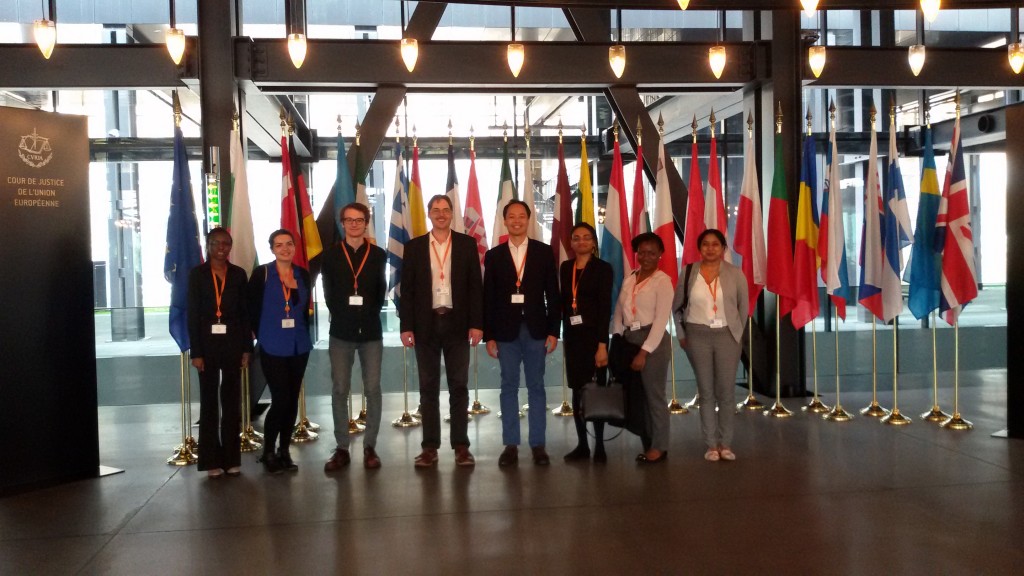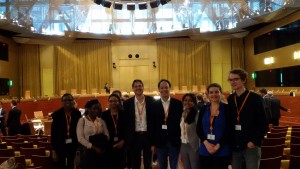A group of Kent LLM students have been taken on a brief study visit to the Court of Justice of the European Union (CJEU) in Luxembourg.
The visit, sponsored by Kent Law School’s Graduate Study Initiative Fund, was organised by the Court for Kent LLM students studying the School’s one-year Master’s in Law programme. Students attended a Grand Chamber hearing before 15 judges as well as receiving presentations on the general functioning and history of the CJEU and on the General Court. Students were also able to visit the CJEU’s library which contains an extensive collection of research materials in the fields of EU, international and comparative law.
Visit Leader Martin Hedemann-Robinson, a Senior Lecturer in European Law, describes the case that students heard in the Grand Chamber:
‘The Grand Chamber hearing concerned an important case (Case C-133/15 Chavez-Vilchez) concerning the legal implications of EU Citizenship under Article 20 of the Treaty of the Functioning of the EU, a status conferred on all nationals of EU member states. Specifically, a Dutch court has requested the CJEU to advise it as to whether Article 20 requires the national immigration authorities to grant a non-EU parent, who is the primary and in practice sole carer of their child who is a Dutch national, a residence permit to be able to live with the child in the Netherlands. The other parent (a Dutch national) had apparently separated from the mother and no longer has any regular contact with the child.
‘Previous CJEU ground-breaking judgments such as Case C-34/09 Zambrano have clarified that Article 20 may be relied upon to require a residence permit be granted to a non-EU parent if otherwise this would mean that a child EU Citizen would effectively no longer be able to utilise their EU Citizenship rights within the Union (namely in having in practice to accompany their deported non-EU parent(s) and live in a non-EU country indefinitely).
‘The Dutch immigration authorities consider that the situation in the Chavez-Vilchez case is materially different from the circumstances in Zambrano because in the current case the other parent is a Dutch national (EU Citizen) and is economically and otherwise potentially capable of taking care of the child. Accordingly, in their view a refusal to grant a residence permit to the non-EU parent would not necessarily lead in practice automatically to a loss of any further opportunity for the child to exercise their rights underpinning EU Citizenship (eg rights to free movement within the EU). Applicants on behalf of the mother and child have submitted that any possibility for the Dutch parent to assume child care responsibilities would be hypothetical and unrealistic, given in particular their estrangement from the family and the close familial ties forged between non-EU parent and child.
‘The CJEU will issue its judgment in the coming months, after the adviser to the Court (Advocate General) has delivered their opinion on the case later this September.’
The Kent LLM
The one-year Master’s in Law programme at Kent Law School is called the Kent LLM. Kent LLM students have the opportunity to develop specialisms in a host of subject areas including: Criminal Justice; Environmental Law; European Law; Intellectual Property Law; International Commercial Law; International Criminal Justice; International Environmental Law; International Law with International Relations; International Law; Law and the Humanities; Medical Law and Ethics; and Human Rights Law. The innovative nature of the programme means that students have the option to leave their choice of specialism open until after they arrive, with their specialisms being determined by the modules that they select. Details of modules are available on our website and an insight into the student experience can be gained by reading the Mastering Law blog.


